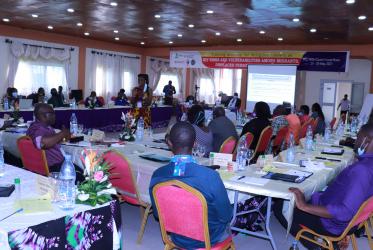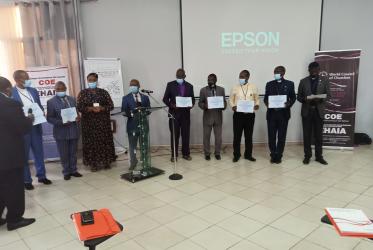Conference Belonging(s)? Migration in theological perspective
Encountering the other as people on the move
Migration is at the heart of churches’ present time debates. The wide-ranged attendance of the conference, Belonging(s)? Theological perspectives on Migration, co-organised by the Federation of Swiss Protestant Churches, the World Council of Churches and the Cantonal Reformed Churches of Berne, Jura and Solothurn, on 31 August 2013 in Berne, reflected the interest of both clergy and lay persons, practitioners and academics, church parishioners and church officers, to reflect on the theme from a theological perspective.
The entry point which the conference has chosen was to take people’s fear of losing their belonging and identity seriously. This fear can be observed on either sides, and is valid for both immigrants and receiving societies. While these feelings of insecurity and estrangement largely dominate the societal discourse, they also have a bearing on the churches’ stand on migration. Not only are they called to safeguard the principles of justice and human dignity for immigrants as for all people created in the image of God, but they also have to take on the pastoral task to accompany people in their existential interrogations around belonging.
Keynotes
The inquiry on belonging is foundational for human existence and the formation of identity, said Amélé Adamavi-Aho Ekué in the first of the two keynote speeches, which dealt with Christian identity between belonging and estrangement. Offering an alternative reading of Ephesians 2: 19, she showed how the integration of the stranger in Church applies also to the integration of the strangeness in every human being. The recognition of the “strangeness within us” contributes to overcome the opposition of “us and them”, which frequently leads to stereotypes and exclusion. She further emphasised, that the question of belonging must not be viewed in the classical sense of being associated with a place, but rather has to be perceived as framework of questioning one’s own certitudes in full recognition that belongings are not permanent and can be lost. Amélé Adamavi-Aho Ekué explored furthermore the theological consequences of presupposing Christian identity between belonging and strangeness. In the biblical narrative both realities are depicted: the belonging to an ethnic community and the detachment from it. Especially the New Testament tradition underlines the Christian identity as one which is formed in cognisance of the human existence as “strangers and sojourners” on earth, and thus people on the move and without belonging in a spatial-temporal sense. This resonates with the story of Jesus Christ, who himself led an existence between belonging and strangeness. He transcended the boundaries, remained on the move and in this manner was accessible especially for the people on the margins of society. She made reference to the World Council of Churches suggestions on an ecumenical response to migration, and highlighted also the ecclesial impact of such thinking leading to the concept of the Church as the “inclusive pilgrimage community”.
In the second keynote speech, Reinhold Bernhardt, professor of Systematic Theology at the University of Basel, explored three dimensions of the topic: belonging as designation for the origin, as term indicating loss and as expression of a future. He described belonging as a social space, which in biblical terms is a place of hope and aspiration. Belonging is in the biblical tradition of the exile also experienced as constitutive for the spiritual practice of the Israelites. In the biblical revelation God is “the one who transcends the borders between belonging and strangeness”, and reveals himself to his people in foreign lands. Belonging has also, so Bernhardt, a qualitative theological connotation. Belonging can be understood as a continuous task towards the formation of identity, or as a future which has to be struggled for, and thus becomes filled with the quality of justice. In this sense, Reinhold Bernhardt, pursued, belonging is about finding a home in one self without losing out of sight its openness into the future. Belonging can thus adequately be described as a space of opportunities, and in more theological terms as the Kingdom of God. This characterisation is also important with regard to the churches’ approach to migration, when the world is seen as the “good house of life for everyone” serving as a motivation for the churches to act in the world for an acceptance and integration of all.
The discussion with the participants of the conference was further stimulated by the two responses respectively offered to the keynote speeches by two Swiss Reformed ministers, Antoinette Steiner and Andreas Nufer, working with migrants and as chaplain in an asylum centre, who underlined the real experiences of migrants and people applying for asylum. Their vulnerable status in the receiving societies urges the churches to think about filling the notion of belonging anew. One the one side belonging has, from within the perspective of migrants’ experiences, to be understood as translating the valorisation of the other, on the other side belonging makes apparent the need of grievance over the loss of belonging. Churches can play a significant role in making these dimensions more visible and to encouraging a protest against increasingly discriminatory practices and policies.
Workshops
Participants also had the opportunity to enter into a deeper reflection on the topic in the seven workshops offered. It became apparent that more opportunities for church members are needed, to engage in a thorough discourse on migration, to untangle the often only too exclusive and discriminatory strands of the public debate and to be able to identify solid theological arguments for the churches’ commitment for migrants.
Study process and continuation of the work collaboration
The conference was also a first and important milestone of an exemplary inter-organisational cooperation. The World Council of Churches together with cantonal churches in Switzerland, and their highest representative body, the Federation of Swiss Protestant Churches, have engaged in a study process over the past two years, with the objective to offer a new stimulus to the theological reflection on migration. The proceedings of the conference will be made public in form of a multi-authored work, into which other scholarly contributions will be incorporated. The production timeline for the publication has been tentatively fixed for 2015. In addition, it is the declared intention of the organising bodies to design an awareness-raising brochure, in order to reach out to a broader public in and outside the churches.




